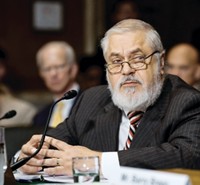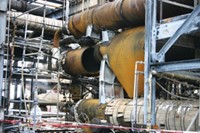Advertisement
Grab your lab coat. Let's get started
Welcome!
Welcome!
Create an account below to get 6 C&EN articles per month, receive newsletters and more - all free.
It seems this is your first time logging in online. Please enter the following information to continue.
As an ACS member you automatically get access to this site. All we need is few more details to create your reading experience.
Not you? Sign in with a different account.
Not you? Sign in with a different account.
ERROR 1
ERROR 1
ERROR 2
ERROR 2
ERROR 2
ERROR 2
ERROR 2
Password and Confirm password must match.
If you have an ACS member number, please enter it here so we can link this account to your membership. (optional)
ERROR 2
ACS values your privacy. By submitting your information, you are gaining access to C&EN and subscribing to our weekly newsletter. We use the information you provide to make your reading experience better, and we will never sell your data to third party members.
Safety
BP's Management Of Process Safety Is Criticized
Panel blames BP top management for safety deficits
by Jeff Johnson
January 17, 2007
A report by an independent expert panel largely blames BP executive management for process safety failures that led to a fatal accident at its largest U.S. refinery two years ago. The report was released on Jan. 16, and it runs more than 300 pages, carries 10 recommendations, and describes a company where process safety was not emphasized, encouraged, or overseen in a manner sufficient to avoid serious workplace accidents.
The report springs from a March 23, 2005, catastrophic accident at BP's Texas City, Texas, refinery in which 15 workers were killed and 170 injured. The accident was the worst of several incidents that occurred at the refinery within a year.
The panel was created by BP, following recommendations of the federal Chemical Safety & Hazard Investigation Board (CSB), which is conducting its own accident investigation. A preliminary CSB report found many of the same problems as the BP expert panel (C&EN, Nov. 13, 2006, page 31).
BP formed its panel in October 2005 and appointed 11 members, made up of accident and process safety experts as well as former secretary of state James A. Baker III, who led the study. The panel's broad charge was to understand the "why" behind process safety deficiencies at the five BP plants operating in the U.S. Panel members visited the refineries and met with workers, engineers, managers, and the public associated with each plant.
The panel found a general corporate culture that does not emphasize process safety. The company's technical staff is capable and experienced, it says, but management does not stress process safety or require and oversee its implementation. The panel's recommendations focus on creating a management system to emphasize and audit chemical plant process safety. It urged BP's board to monitor implementation for at least five years.
The panel said it was "under no illusion" that these deficiencies were limited only to BP and urged other companies to evaluate their own operations in light of its findings.
BP, like many other companies, monitors personal safety accidents more than it watches plant process safety, says Glenn Erwin, a panel member with the United Steelworkers union. "It's important how well you lift with your legs and all that, but the industry has potentially many low-probability, high-consequence incidents. In the chemical and petrochemical industry, it is all about process safety".
"If we audited our plants and manufacturing process safety programs the way we audit our financial programs, we would have a better handle on these plants," Erwin continues. "Audit systems should determine how well we are doing in the whole plants and how well our systems are working, not just how well we are doing in handling the money."
BP endorsed the report as it was released, and BP Group Chief Executive John Browne said in a statement that company leaders would meet with the panel within a week to determine how to address the recommendations. He promised to make the company an industry leader in process safety management and performance.
The company has spent more than $2.6 billion in accident-related improvements and legal settlements. Browne announced his retirement on Jan. 12.
The report is available through BP at www.bp.com.





Join the conversation
Contact the reporter
Submit a Letter to the Editor for publication
Engage with us on Twitter